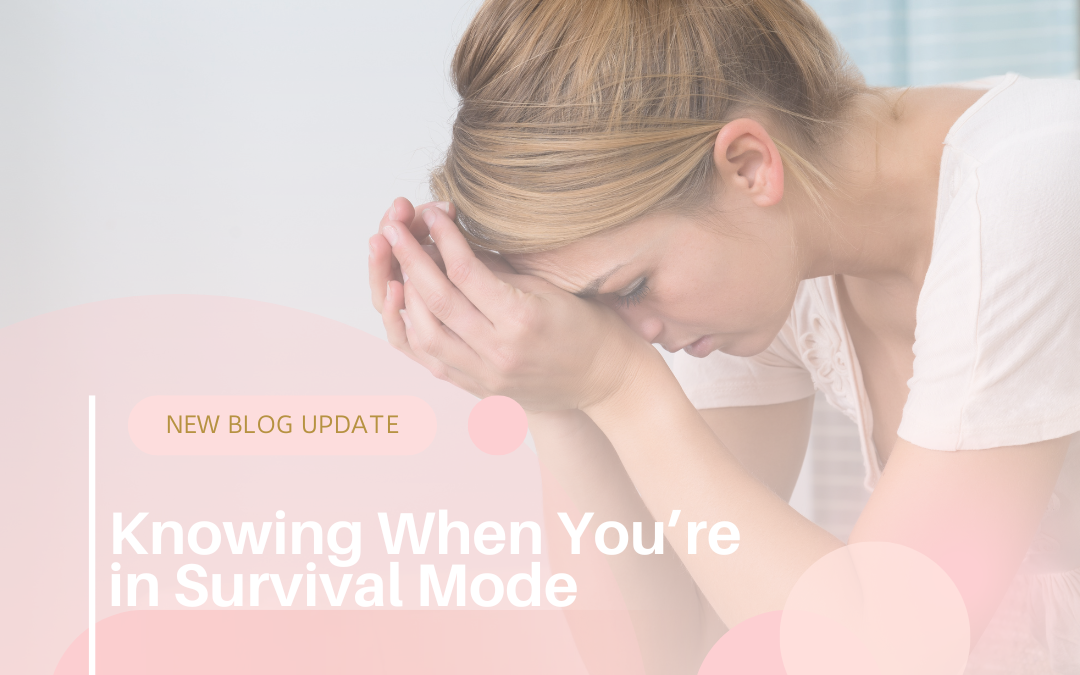Have you ever felt like you were just getting through the day rather than truly living it?
Maybe you’re constantly tired, emotionally detached, or overwhelmed by even small tasks. If this sounds familiar, you may be operating in survival mode—a state where your mind and body are focused on simply making it through, not thriving.
Recognizing survival mode is a powerful first step toward reclaiming your peace, your energy, and your sense of self.
What Is Survival Mode?
Survival mode is a natural stress response that kicks in when we perceive a threat—physical, emotional, or psychological. While it’s helpful in short-term crises, staying in this state for long periods can be emotionally exhausting and harmful to our mental health.
It’s the body’s way of saying: “Something’s not right, and I need to protect you.”
Common Causes of Survival Mode
Survival mode can be triggered by:
-
Chronic stress (work, caregiving, finances)
-
Trauma or ongoing emotional pain
-
Burnout from overextending yourself
-
Grief or loss
-
Unresolved childhood experiences
-
Unsafe or unstable environments
When these stressors persist, your nervous system may struggle to shift out of high-alert mode, even when the immediate danger has passed.
8 Signs You’re Living in Survival Mode
1. Constant Exhaustion
You wake up tired, go through your day drained, and still can’t seem to rest. Physical fatigue, even after sleeping, is a red flag your nervous system is overtaxed.
Rest doesn’t help when your soul is weary.
2. Emotional Numbness or Detachment
You may feel disconnected from your emotions, relationships, or passions. You go through the motions, but joy, excitement, and even sadness feel out of reach.
Survival mode numbs pain—but it also dulls pleasure.
3. Hypervigilance or Anxiety
You’re always on edge, scanning for what might go wrong. Even small problems feel catastrophic. Your mind struggles to find peace.
When your nervous system is on high alert, even silence can feel loud.
4. Difficulty Concentrating or Making Decisions
Your brain feels foggy. You find it hard to plan ahead, prioritize, or make even basic choices—because your mind is preoccupied with “staying safe.”
5. Isolation or Withdrawal
You may pull away from loved ones, not because you don’t care, but because you have nothing left to give. Socializing feels overwhelming or burdensome.
You’re not antisocial—you’re emotionally depleted.
6. Increased Irritability or Outbursts
Small frustrations spark big reactions. When you’re overwhelmed internally, the external world feels like too much to handle.
7. Relying on Coping Mechanisms
This might include overworking, binge-watching, emotional eating, or substance use. These behaviors offer temporary relief but often leave you feeling worse.
8. Feeling Stuck or Hopeless
You may feel trapped in your circumstances or disconnected from your future. Your dreams and goals feel distant—or irrelevant.
The Importance of Recognizing Survival Mode
Survival mode isn’t a weakness—it’s a signal. It’s your body’s way of telling you something is out of alignment. It’s asking for rest, connection, healing, and safety.
By acknowledging this state, you can begin to move from just surviving… to living fully.
Steps Toward Healing
1. Name It Without Shame
Understanding that you’re in survival mode is an act of bravery. Release the guilt and self-judgment.
2. Prioritize Rest and Safety
Slow down where you can. Rebuild routines that restore your body and calm your nervous system.
3. Practice Mindful Grounding
Breathing exercises, nature walks, or journaling can help reconnect you to the present moment.
4. Reconnect with Support
You don’t have to do this alone. Lean on trusted friends or family—and don’t hesitate to seek professional help.
5. Begin Trauma-Informed Healing
Working with a therapist, especially one trained in trauma or nervous system regulation, can be transformative in moving out of survival mode and into a space of empowerment.
You Deserve to Thrive
Life is more than just getting through each day. You deserve peace, joy, and the ability to fully experience your world. Survival mode may have protected you once—but healing will carry you forward.
Need Support? We’re Here.
At Central Valley Family Therapy, we understand what it means to live in survival mode. Our compassionate therapists offer trauma-informed, holistic care to help you rediscover safety, strength, and emotional balance.
You’re not broken—you’re healing. Let us walk with you.


Recent Comments